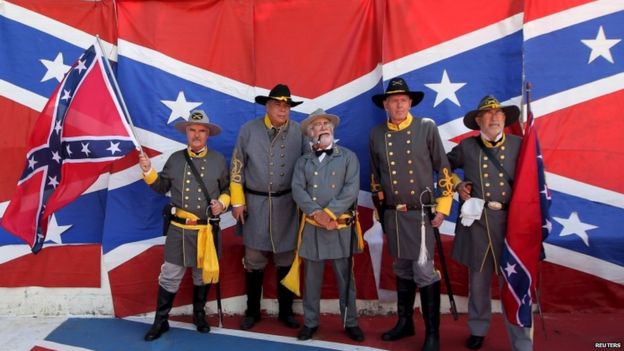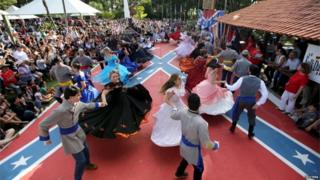
Thousands of Brazilians attended a celebration in Americana, Brazil, last Sunday for the “Festa Confederada,” the Confederate Festival. Most are descendants of the thousands of Confederates that left the United States after the end of the Civil War in the 1860s. Eager for educated white colonists, Brazilian Emperor Dom Pedro II advertised in newspapers across the Southern States offering free land to immigrants. In the aftermath of the Civil War, as many as 10,000 Americans took the offer, leaving behind postbellum Alabama, Tennessee, and Mississippi.
"I don't speak English and the only place I've been to in the U.S. is Disneyworld, but I feel the heritage," said Alcina Tanner Coltre, 77, whose great-great-grandparents migrated from Mississippi. "My great-grandfather married a Brazilian woman, so he integrated into Brazilian culture pretty quickly, but it's really important to me to come out every year to remember where we come from."
American tourists -- some from the South -- visited this year’s Festa Confederata on the 150th anniversary of the end of the Civil War. They learned about how Confederates lived and died (many from tropical disease), 5,000 miles away from home, creating a hybrid culture. While slavery was legal in Brazil until 1888, decades after colonists arrived, historians say that few of the white immigrants would have held slaves because they were too poor. Instead of recreating a plantation culture, they intermarried with Brazilians of Portuguese, indigenous and even African descent.

Many visitors, Civil War buffs themselves, were impressed with the event’s costumes, dancing and decorations.
“It feels really authentic,” said Gwen Gray, a 69-year-old retiree originally from Greeneville, Tennessee, who came all the way from New Mexico.
Attendant danced to country music, waved Confederate flags and watched a performance of “Amazing Grace.” Many showed up in Civil-War-Era garb, even mixed race Afro-Brazilians.
"Imagine if I were to show up dressed like this in the middle of New York," he said. "I would get beaten! But not here. For us in Brazil, it has no political meaning at all," said 34-year-old João Leopoldo Padovese, dressed in a grey Confederate battle uniform.








